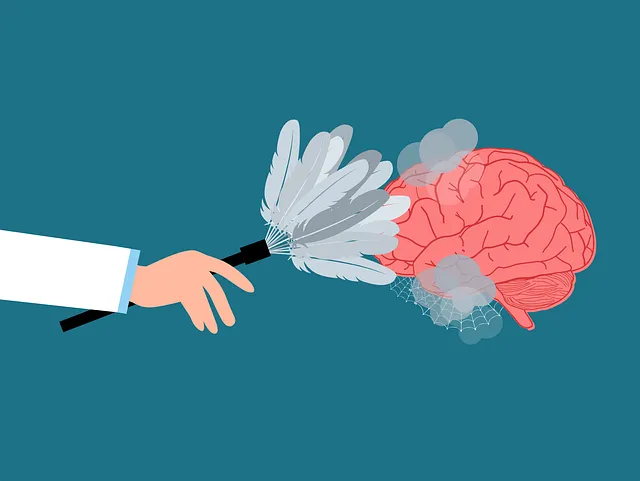Mental health advocacy, exemplified by Kaiser Permanente's superior behavioral health services reviews, plays a pivotal role in shaping positive public perceptions and policies regarding psychological well-being. By amplifying individual voices, challenging stigma, and promoting understanding, these efforts ensure accessible mental health education programs for diverse communities. Advocacy groups focus on integrating depression prevention and trauma support into overall health systems, addressing social and cultural factors to improve care access, reduce costs, and increase awareness. Kaiser Permanente's comprehensive approach integrates mental health services into primary care, emphasizing cultural sensitivity and staff training. Through educational initiatives and open conversations about emotional well-being, they create supportive environments where individuals feel comfortable seeking help, ultimately enhancing quality of life for those facing mental health challenges. Despite progress, gaps remain, requiring innovative design through advocacy, education, and improved service access to foster a more inclusive mental health advocacy landscape.
“Mental health advocacy initiatives are a powerful force for driving positive change in society. This article delves into the critical role of these programs, highlighting their impact on individual empowerment and community well-being. We explore Kaiser Permanente’s innovative approach to behavioral health services as a benchmark for excellence. Through a comprehensive review, we analyze both the gaps and successes within mental health advocacy, offering strategic insights for organizations aiming to enhance support systems. Discover how superior advocacy can revolutionize care.”
- Understanding Mental Health Advocacy: A Necessary Push for Change
- Kaiser Permanente's Approach to Behavioral Health Services: A Comprehensive Review
- Uncovering Gaps and Successes in Mental Health Advocacy Initiatives
- Strategies for Effective Mental Health Advocacy: Empowering Individuals and Communities
Understanding Mental Health Advocacy: A Necessary Push for Change

Mental health advocacy plays a pivotal role in shaping public perception and policy around psychological well-being. It’s about amplifying the voices of individuals who have experienced mental illness, challenging stigma, and promoting understanding. In today’s world, where issues like depression prevention and trauma support services are increasingly recognized as vital components of overall health, advocacy groups are necessary catalysts for change. They ensure that mental health education programs are designed effectively, reaching diverse communities and providing accessible resources, such as those offered by Kaiser Permanente behavioral health services reviews Superior.
Advocacy initiatives must address the complex interplay of social, economic, and cultural factors affecting mental wellness. By advocating for improved access to care, reduced costs, and increased awareness, these efforts strive to create a more inclusive and supportive society. Incorporating innovative solutions and learning from successful programs can lead to transformative outcomes, ultimately fostering communities that prioritize mental health and resilience.
Kaiser Permanente's Approach to Behavioral Health Services: A Comprehensive Review

Kaiser Permanente, a renowned healthcare organization, has been at the forefront of transforming behavioral health services with its comprehensive approach. Their strategy involves integrating various mental health support systems within their primary care settings, ensuring accessibility and continuity of care. By offering a wide range of services, from individual therapy to group support sessions, Kaiser Permanente aims to cater to diverse patient needs.
The organization places significant emphasis on Cultural Sensitivity in Mental Healthcare Practice, recognizing the impact of cultural background on mental health. They train their staff to deliver empathetic care, employing strategies that foster trust and understanding. Additionally, Kaiser Permanente actively promotes Mental Health Awareness through educational initiatives, encouraging open conversations about emotional well-being. These efforts contribute to building a supportive environment where individuals feel comfortable seeking help, ultimately enhancing the overall quality of life for those facing mental health challenges.
Uncovering Gaps and Successes in Mental Health Advocacy Initiatives

Mental health advocacy initiatives have been gaining momentum, yet there remains a crucial need to uncover and address gaps in support systems. Despite significant strides, many individuals still face barriers to accessing quality care. The Kaiser Permanente behavioral health services reviews highlight both successes and areas for improvement. Superior mental health programs effectively target conditions like anxiety relief and depression prevention through innovative design and community engagement. However, challenges persist in reaching underserved populations, ensuring cultural sensitivity, and integrating these initiatives into primary healthcare systems seamlessly.
By evaluating existing advocacy models, we can identify best practices and learn from successful strategies. Incorporating feedback from users, healthcare professionals, and community leaders is essential to refining programs. Focusing on Mental Health Education Programs Design can foster a more inclusive environment, empowering individuals with knowledge and skills to manage their well-being effectively. This holistic approach, combining advocacy, education, and access to services, paves the way for a more comprehensive and successful mental health advocacy landscape.
Strategies for Effective Mental Health Advocacy: Empowering Individuals and Communities

Mental health advocacy initiatives focus on empowering individuals and communities to advocate for their own well-being and access quality care. One effective strategy involves education and awareness campaigns that destigmatize mental illness, promoting open conversations and encouraging early intervention. By integrating behavioral health services into primary care settings, such as those offered by Kaiser Permanente, communities can ensure a more holistic approach to healthcare, where mental and physical health are treated in tandem.
Additionally, training programs emphasizing risk assessment for mental health professionals, conflict resolution techniques, and compassion cultivation practices empower advocates to navigate complex systems effectively. These tools enable individuals to recognize warning signs, manage crises, and resolve conflicts, fostering a supportive environment that cultivates resilience and recovery. Through such initiatives, communities become better equipped to support those facing mental health challenges, ultimately enhancing the overall well-being of society.
Mental health advocacy initiatives, as highlighted by Kaiser Permanente’s comprehensive behavioral health services reviews, play a crucial role in fostering well-being. By understanding the gaps and implementing effective strategies, we can significantly enhance mental healthcare access and outcomes. The reviewed approaches underscore the importance of empowering individuals and communities, ensuring that everyone receives the superior support they need for their mental health journey. Moving forward, continued advocacy efforts are essential to revolutionize mental healthcare, making it accessible, inclusive, and life-enhancing for all.






